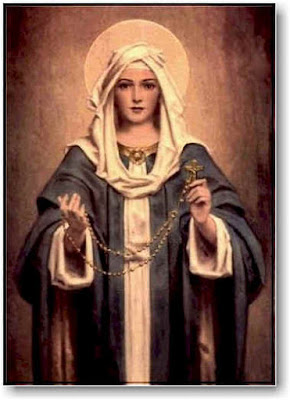 |
| “Our Lady of the Rosary” Artist and Date are UNKNOWN |
Commentary:
Reading 1: Galatians 3:7-14
Commentary on Gal 3:7-14
The thrust of St. Paul’s argument, in this part of his letter to the Galatians, is that Christians (especially Gentiles/Pagan converts) are brought to salvation (justified before God) by faith, not observance of Mosaic Law (including, according to the “Judaizers,” circumcision). The apostle points out that they are all “children of Abraham,” receiving his blessing (see Genesis 18:18).
St. Paul argues that those who depend upon works of the law, essentially trying to “earn” salvation, have been cursed by the law, quoting Deuteronomy 27:26. Salvation, he argues, comes from faith in Christ who died upon the cross, taking upon himself that curse that we no longer have to bear (the reference made here relates to Deuteronomy 21:23, a reference to criminals executed publicly).
St. Paul makes these arguments to refute those who have told the Galatian community that it is only through observance of Mosaic Law that they may come appropriately to faith in Christ. St. Paul tells them clearly that faith in Christ is sufficient; justification and salvation come through faith and the Holy Spirit.
------------------------------------------------------------------------------------
Responsorial Psalm: Psalm 111:1b-2, 3-4, 5-6
R. (5) The Lord will remember his covenant for ever.
Commentary on Ps 111:1b-2, 3-4, 5-6
Psalm 111 is a song of praise and thanksgiving. In this selection we find the singer giving thanks for God’s guidance, and the Lord's works of creation and salvation. References to the covenant in these strophes relate directly to the promises made to Abraham and his descendants. The hymn professes God’s greatness, revealed in creation, and revered by all that live and have being.
------------------------------------------------------------------------------------
Gospel: Luke 11:15-26
Commentary on Lk 11:15-26
In this selection from St. Luke’s Gospel, the Lord is challenged by the Pharisees who do not deny the reality of the miracle, but want one of national importance (as befitting the Royal Messiah), as opposed to the one he performs – salvation for the poor and needy. His critics say that he has power over evil spirits because he is in league with Satan, their master. Jesus refutes this idea (he actually makes an allusion to Exodus 8:15 where, by the “finger of God,” Moses brought about God’s will, and the Egyptian magicians were unable to duplicate his actions) asking: “if Satan is divided against himself, how will his kingdom stand?” He then tells his audience that God is stronger than Satan, which is why he is able to cast out the evil spirits.
The passage concludes with a subtle but important message that says in essence: if an evil that tortures the spirit is removed, and strength from God is not substituted to fill it up, that evil will return, worse than before (see also 2 Peter 2:20).
------------------------------------------------------------------------------------------
Reflection:
We have all heard the rhetorical question: “Are you a glass half empty or half full kind of person?” We know this question refers to our attitudes – are we optimistic (glass is half full) or are we pessimistic (glass is half empty). Today we think about this question of attitudes with a very basic scientific axiom in mind; “nature abhors a vacuum.” This axiom means that any empty space will eventually be filled with something.
The Gospel begs us to see ourselves as sacred vessels or cups that must be filled. In the final verses of the Gospel, Jesus reminds us that if we have emptied ourselves of all that is evil, all that is bad or destructive, we must fill ourselves with what is good, or that which we worked so hard to dispel will come rushing back in. This message is not wasted upon those who run rehabilitation programs. People who recover from addictions to drugs or alcohol require something to fill up the holes in their lives left when the addictive behavior is eliminated. There must be something to fill up that void, and if faith is not put in place, the addiction will return.
In a more subtle way, each of us has these empty spaces. They may be spaces once filled with cravings or vocations (it’s no accident that people who retire and have no hobbies or outside interests die so quickly), but they exist. If we do not consciously fill these spaces with holiness, something else will fill them, likely something we do not want (I gained fifty pounds when I quit smoking my pipe).
Today the Lord asks us to fill ourselves with his love. Our spiritual selves must be filled with an active and lively faith. The more fully we embrace this active spirituality, the less room there will be for those thoughts and actions we do not want to enter our lives. It becomes a matter of disciplining ourselves to the faith we share. We must plan to pray or to act on our faith with charity and then follow our plan. If we do not, if we simply think: “Ah, that’s a great idea. I’ll try something like that.” But if we take no action on those thoughts, the space we want to fill remains empty -- and “nature abhors a vacuum.”
On this day, the memorial of Our Lady of the Rosary, let our plan be to take some concrete action to fill ourselves with all God’s spiritual blessings. In doing so, may we also share those blessings with those with whom we have contact, that God’s love may be spread through us to the entire world.
Pax
[1] The picture used today is “Our Lady of the Rosary” Artist and Date are UNKNOWN
No comments:
Post a Comment